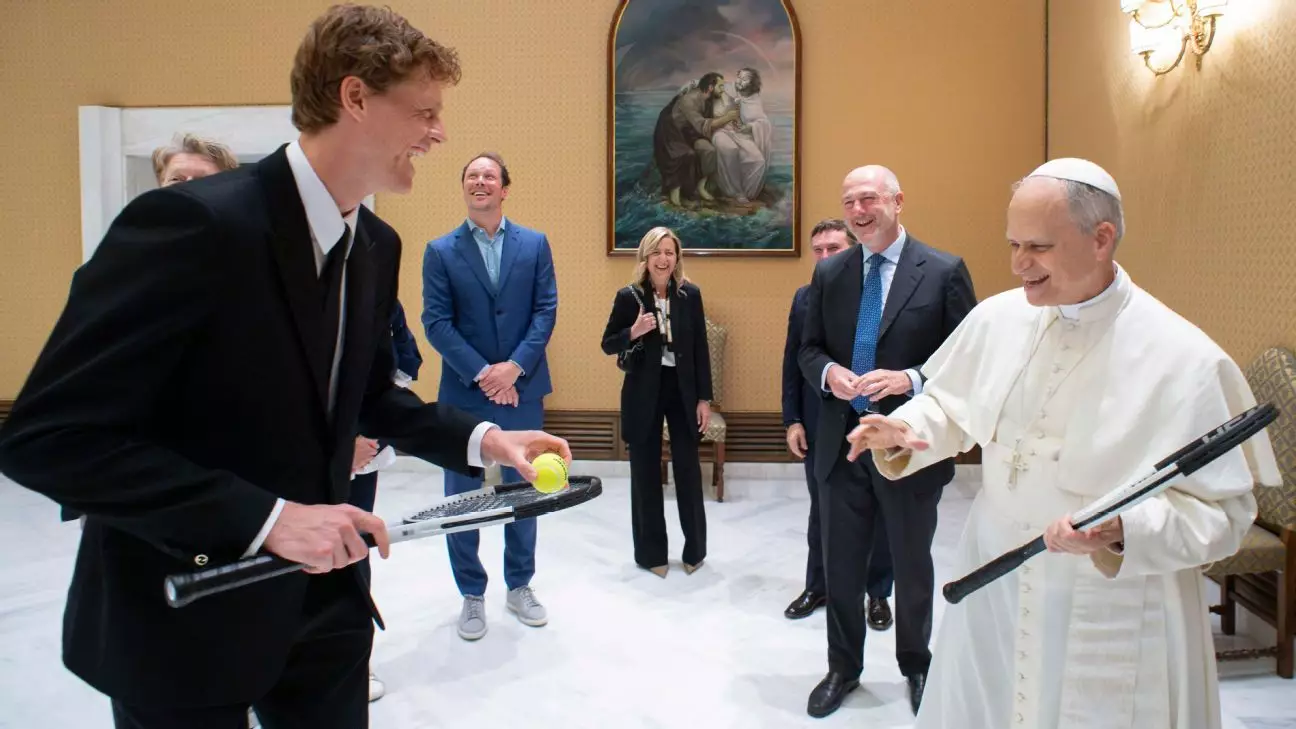In a remarkable intersection of faith and sport, Pope Leo XIV welcomed Jannik Sinner, the world’s top-ranked tennis player, to the Vatican this week. Their meeting was more than just a friendly exchange; it symbolized a unique alignment of athletic passion and spiritual leadership. The significance of the encounter could not be understated, as Sinner presented the Pope with a tennis racket—an emblem of their common enthusiasm for a sport that transcends borders.
Pope Leo, the first American pontiff in history, is not only known for his theological insights but also for his energetic embrace of sports culture. Earlier in the week, he had expressed his love for tennis, humorously dismissing an invitation to play with Sinner by implying that the name “Sinner” would be unpropitious as a pun on sin itself. This comedic banter signaled a jovial spirit that would pave the way for a more cordial encounter just days later.
The Spirit of Charity and Camaraderie
Sinner, who has recently made headlines due to a controversial three-month doping ban, has returned to the court ready to challenge history. In his first tournament back, he aims to become the first Italian male to seize the Italian Open title since 1976. This visit to Rome was as much about sport as it was about redemption, and the Pope’s graciousness provided a welcome backdrop to Sinner’s arduous journey. The tennis player’s lighthearted proposal for a quick volley exemplified the instinctive camaraderie that often emerges between athletes, even in the hallowed halls of the Vatican.
The Pope’s humorous comments on his white cassock, likening it to the attire required for Wimbledon, expanded the playful atmosphere. Such interactions not only uplift the spirit but also frame high-profile figures in a human context—something that is often lost within their usual ceremonial roles. This lightheartedness served to further connect the audience with the realities of both man and sport, dissolving the often rigid barriers between complex identities.
Cultural Significance of the Meeting
The encounter was underscored by the symbolic value of sports in bridging divides, as underscored by Angelo Binaghi, head of the Italian Tennis and Padel Federation. Binaghi’s presentation of an honorary federation card to Pope Leo not only acknowledged the Pope’s interest but reflected a deeper cultural appreciation for tennis as a unifying force. Binaghi’s hope to see the Holy Father back on the court soon conveys the sentiment most athletes hold dear: the love and community that stems from sport.
The meeting held more than mere amusement; it was a dialogue of mutual respect and admiration. Sinner posed for photos in front of two prestigious trophies: the Davis Cup, which he helped Italy secure, and the Billie Jean King Cup—both representing Italy’s prowess in tennis. This not only highlighted Italy’s rising status in the sport but also marked the Pope’s endorsement of athletic excellence.
The Role of Sports in Modern Vatican Culture
Pope Leo XIV’s selection as a pontiff has breathed fresh air into the Church’s interaction with contemporary culture, especially through the lens of sports. His predecessors often leaned into nationalistic loyalties, yet Leo’s enthusiasm for tennis—and even baseball—illustrates a broader, inclusive vision. Recognizing these cultural touchstones resonates with millions and reinforces the idea that the Vatican, while being a spiritual center, embraces the zeal and dedication of sportsmanship.
In a world where divisive rhetoric often overshadows collaboration, Leo XIV’s engagement with Sinner may inspire others to celebrate sports as an avenue for solidarity. This meeting not only promoted goodwill but also reminded both sports fans and observers that passion—whether on the tennis court or in the pews—has the power to unite people across disparate backgrounds and beliefs. It uplifts the spirit and fosters a message of hope and camaraderie, essential in today’s volatile social terrain.
The Pope’s infectious spirit for tennis could encourage a generational shift, where young athletes might find inspiration in faith as much as in competition. Ultimately, it’s not just about the game; it’s a clarion call for unity in our increasingly fragmented world.

